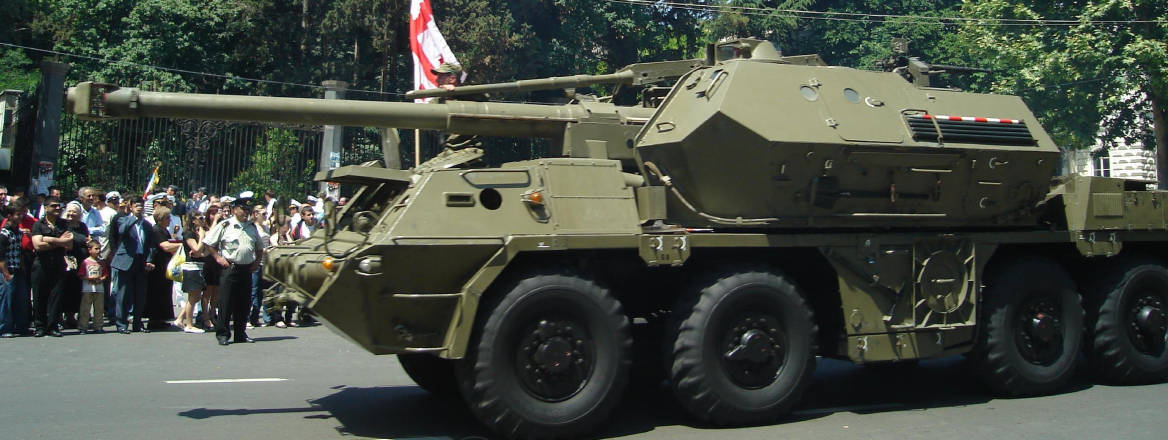Russia’s ‘Silent’ Occupation and Georgia’s Territorial Integrity
Russia’s pressure on Georgia continues, both through the gradual seizure of more territory and through massive propaganda campaigns.
It’s been more than a decade since Russian forces invaded Georgia and occupied 20% of the country’s territory. But Russia continues to violate Georgian sovereignty and territorial integrity with its aggressive ‘borderisation’ policy, a strategy which entails the gradual annexation of further Georgian territory through the expansion of its already illegal occupation zones. And a timid Western response to this gross violation may have given Moscow a green light to annex Crimea in a similar land grab in 2014.
The forgotten conflict costs real lives. The recent death of a 29-year-old Georgian, Irakli Kvaratskhelia, is a case in point; he joins the long list of Georgians who have been kidnapped and/or killed by Russian-backed separatists. Kvaratskhelia was detained as he was crossing into his native Gali district in Abkhazia. The de facto Abkhaz authorities claim he committed suicide, but preliminary examinations show his body bears signs of torture. A few days after Kvaratskhelia’s death, on 17 March 2019, occupying forces detained another Georgian, Givi Beruashvili, in Ditsi, a village near the occupied Tskhinvali region. Beruashvili’s ‘crime’ was to visit his grandparents who live 500 metres away from the occupation line. The lack of international awareness and an absence of international monitoring missions in occupied territories encourage Russia to behave aggressively and to violate human rights.
Since the occupation of the Abkhazia and Tskhinvali region and the recognition of their independence by Russia, the so-called administrative border line (ABL) has been separating the seized territories from the rest of Georgia. This ‘borderisation’ allows Russia to push the ABL, expanding an occupation zone. Georgians are expelled from newly occupied land and face kidnapping if they cross the ABL that Moscow has arbitrarily established.
The policy exploits Tbilisi’s concern over the lasting loss of its territory, pushing the Georgians to the negotiation table with the Kremlin. Border markers were pushed to the village of Tsitelubani in 2015, which included a 1,605-metre section of the 830 km Baku-Supsa oil pipeline that is operated by the energy giant BP on a territory that Russia now occupies. Simultaneously, the ABL’s advancement towards the only motorway that links western Georgia, including its Black Sea coast, to the rest of the country allows Moscow to safeguard its strategic card by threatening to disconnect Georgia in the future (the ABL is currently only 400 metres from the motorway) and force Tbilisi’s submission to the Kremlin’s will.
Occupying forces have, between 2017 and 2019, detained 327 Georgians for ‘illegally crossing the border’ and unlawful detentions have become frequent in recent years. Only three months into 2019, 16 individuals have been illegally detained. Such cases demonstrate Russia’s continued hostile intent against Georgians, as well as breaching of the EU-mediated 2008 Ceasefire Agreement and the maintenance of an illegal presence of Russian troops on Georgian soil, all hindering Tbilisi’s efforts to reconcile divided communities.
Georgia’s pro-Western foreign policy – a deepening of US–Georgia relations and an overwhelming popular support to join NATO and the EU – evidently generate frustration in Moscow. But the choices made by a large majority of Georgians remain unshaken. Recent polls compiled by the US National Democratic Institute (NDI) show that 83% of respondents are in favour of Georgia joining the EU and 78% support a NATO membership. Moscow’s tactics are designed to undermine this desire for integration by creating enough problems to allow the Kremlin to claim that the Euro-Atlantic community is unwilling to integrate Georgia or do anything preventing Russia from expanding its zone of occupation.
Still, neither of these strategies seems to be working. The strategic partnership between Georgia and the US reached new heights when in 2017 the US State Department authorised a military sale to Georgia, the Javelinman-portable ‘fire-and-forget’ anti-tank missiles and Javelin Command Launch Units (CLUs). These have been on Georgia’s wish list for many years. Washington’s plan to sell Georgia FIM-92 Stingers, a man-portable air defence system, highlights the US commitment to continue a close cooperation in the defence and security field. Georgia is also advancing in its cooperation with NATO and currently is the largest non-NATO contributor to the International Security Assistance Force (ISAF) in Afghanistan. The joint NATO–Georgia Exercise 2019 held last month is another example. Such intensified relations between Tbilisi and Washington, paired with Georgia’s aspiration to join the alliance, are met with further Russian efforts to cause social disruption and antagonism towards Western values within the Georgian population.
Fake News
Disinformation campaigns from Moscow often directly involve high-level officials from its foreign and defence ministries, as well as President Vladimir Putinhimself. Moscow launched, for instance, its pre-planned information warfare campaign against the US-funded Richard Lugar Center for Public Health Research, which is based in Tbilisi, on 11 September 2018. The Lugar Center is a laboratory that is part of Georgia’s public healthcare system. The Russian Commander of Radiological, Chemical and Biological Defense Troops, Igor Kirilov, claimed the Lugar Center is a lab where the US allegedly carries out illegal experiments on humans, supposedly killing more than 73 people. Moscow also accused Washington of developing biological weapons at the Center. Such a high-profile attack on the Lugar lab could also be a strategic move to undermine the US efforts to weave Georgia into the Trans-Atlantic community by stirring public distrust.
Georgia’s Place in Putin’s Strategy
Russia’s use of ‘salami tactics’ is nothing new. In recent years, however, Moscow has more proactively been using violent means to undermine Georgian sovereignty. Putin’s recent decline in approval rankings could be one of the factors for increased provocations. According to a recent survey conducted by Russian polling organisation the Levada Center, Putin’s approval ratings have fallen to their lowest level since 2006, with only 33.4% feeling confident in Putin’s government. Unpopular proposals, like increasing the retirement age, and sluggish economic growth frustrate the public. Putin has won popular support from adventurism in foreign policy; the occupation of Georgia’s territories and the annexation of Crimea boosted his ratings. Kremlin strategists have so far skilfully distracted the public by showcasing Russian military strength abroad.
Nevertheless, Moscow faces a different reality, one that is marked by economic hardship, political isolation and costly military interventions. It is highly unlikely that during such testing times, Putin would consider capturing new states in a wager to boost his popularity.
As ordinary Russians begin to question Putin’s efforts to make Russia great again, the loss of domestic confidence and political isolation must frustrate Putin. Georgia seems to be a perfect place to accomplish his aims, being the region’s most openly pro-Western country but one that is still not shielded by NATO’s umbrella. This is not the first time that Russia has simultaneously used ‘borderisation’ and aggressive information warfare tactics, as seen in Moscow’s seizures of Abkhazia and Tskhinvali region and its use of fake news, and Tbilisi is aware of what the Kremlin could do to drag the country into chaos.
Since a military option is unavailable for Georgia, its tools for deterring Russia’s creeping annexation are limited. Georgia must strengthen its strategic communications to shed light on fake news and Russian propaganda efforts that aim to discrediting Georgia’s pro-Western agenda. Most importantly, Tbilisi needs to push its Western allies to react with practical tools, such as imposing tougher sanctions on Russia, in order to prevent further violations of international law on Georgian soil.
Natia Seskuria works at the Georgian Ministry of Defence and is also a Lecturer in Russian Politics at the University of Georgia. Prior to this, she worked in consulting in London and at RUSI. Natia holds a BA and MA in Politics and Security Studies from UCL and speaks seven languages.
The views expressed in this Commentary are the author's, and do not necessarily reflect those of RUSI or any other institution.
WRITTEN BY
Natia Seskuria
RUSI Associate Fellow, International Security


